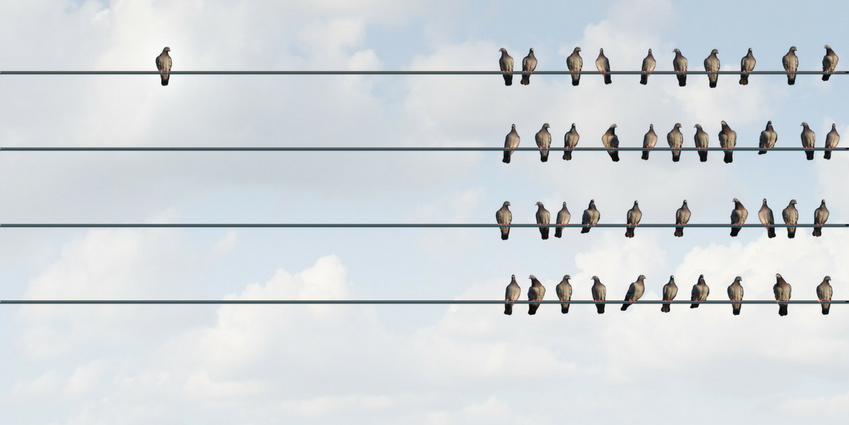
by Anisha Dadia
J.K. Rowling once said:
“There is an expiry date on blaming your parents for steering you in the wrong direction; the moment you are old enough to take the wheel, responsibility lies with you.”
I came across that quote last year, and ever since I’ve been contemplating its greater meaning and whether it applies to me. For a long time, I blamed my upbringing for my so-called rebellious life choices. Growing up in Britain’s suburban middle class had its own share of issues, especially when you throw in conservative Indian parents who seem to have a pre-determined route laid out for you.
From a very young age, I was told by friends at school and then at University that I was funny, that I had a particular quirky sense of humor. I knew that I was different from my brown-skinned peers because I was unabashedly self-deprecating about my height, weight and skin color, and this seemed to draw in a lot of laughter, the kind which that gave me a high and spurred me into believing that I was born to perform. I joined drama clubs and participated in plays.
Despite my parental chagrin, I wasn’t ashamed of dressing in drag, doing strange accents and making a fool of myself. An element of “what will others think?” coupled with my potential marriage ineligibility was also at the helm of their shame and embarrassment. Back then I couldn’t care less about maintaining my femininity or my dignity and this is where we never saw eye to eye.
[Read Related: The 21st Century Brown Girl’s Balancing Act Between Modernity and Tradition]
And so, naturally, after many years of suppressing this “unnatural” urge to do so, I eventually threw caution to the wind, saved up and in 2010 moved to the States. I was the first one in my family to just up and leave. Shamefully, I didn’t even tell my parents that I had enrolled in an acting conservatory until 10 months in. Instead, I fed them a lie about learning about the film industry. Why? Because I knew they’d be against it and I didn’t want the added pressure and guilt, that I knew was imminent. I wanted that chance to break-away, enhance and create. I just wanted to try.
Yes, I could ultimately blame my upbringing for my ambitious appetite for the arts. In hindsight, I could say that I felt trapped, stifled even, and therefore rebelled against the norms of academia simply because the artistic world seemingly welcomed my untamed and oddball spirit. But the backlash I have received over my particular choices has, in essence, been devastating and heart-breaking. The dichotomy of what I want and what my parents want me to want is a gaping chasm that cannot be easily leaped across. Not a tiny fracture that can be easily healed with compromise and heart-to-hearts.
My parents and I, both, feel incredibly misunderstood and under-heard. When I was younger, their stubbornness to concede with my goals only solidified my motivation to prove them wrong. I wanted so badly to show them what I was capable of. Show them that I was talented.
And yet, six years later, I am vaguely starting to see what my parents see. This is not to say that I have completely softened or their constant dissuasion from pursuing the arts has worn me down. It is unlikely that I will soon pack up and move home, get married and become a pharmacist. Although there is nothing wrong with being a pharmacist.
[Read Related: What Happens When You Write About Dating in a Culture Where Relationships are Taboo]
What I am finally seeing is that, at the crux of it all, at the very core of what they want for me is stability. I don’t think they are monsters for wanting that.
Maybe it’s an age thing. I’m now thirty. The rumors are true! Everything has changed! I have a ton more white hairs and I am seeing my future much more practically. The arguments about my future and my career are becoming futile because yes, I am no spring chicken and yes, I do want a pension plan.
They say millennials are the bane of society: arrogant, narcissistic and needy. We want to earn more, love more and travel more but with less effort. We don’t want to become doctors, but we are happy for our parents to pay for our healthcare (and dental care). If we are lucky enough to have decent parents, financially independent or not, we still vaguely absorb their opinion and cherish their pride. However, as I’m realizing, with age comes the apparent truth of your parents’ finiteness. The arguments will eventually cease. And then what?
Following your dreams is one thing but then expecting to have it all is another. That’s not to say I’ll acquiesce to my father’s wishes and search for a job at the UN. Again, there’s nothing wrong with working for the UN. But yes, if I do want a family eventually, maybe my parents were right to dissuade me from pursuing such an unstable career. I still do love acting but after the gauntlet of auditions, rejections and false hopes, of course, I start to question what I’m doing. Is it worth it? After six years of trying, is it really worth it?
And, of course, there are those that still continue to pursue their unorthodox dreams and are successful at it. They have defied their parents’ wishes and are pleased with their progress. Sometimes their parents, reluctant or not, surrender to their children’s wishes if only to see their child happy.
What has happened has happened and plans change. Goals change. Priorities shift, somewhat. I can say that I did my best and will try to feel proud of my accomplishments. I’m definitely not going to give up on everything, however, even though I’ve made peace with the fact that I might not win a Best Actress Oscar, if I can somehow still maintain a presence in the arts while not completely succumbing to squalor, then that is the new goal for the future. If an exact compromise is unattainable, then maybe I can try and find solace in accepting what my parents want for me and fight less for what I want. Well, a little less. After all, if the title of “rebel” is what I have earned, then I’ll own it. I’ll just be a little more sensible about it.
 Anisha Dadia is a British, multi-lingual, irreverant comedienne, writer and actress, that teaches during the day and is a voiceover artist by night. She is passionate about equality for all, running medals and accents. Particularly, the ones she can do.
Anisha Dadia is a British, multi-lingual, irreverant comedienne, writer and actress, that teaches during the day and is a voiceover artist by night. She is passionate about equality for all, running medals and accents. Particularly, the ones she can do.



